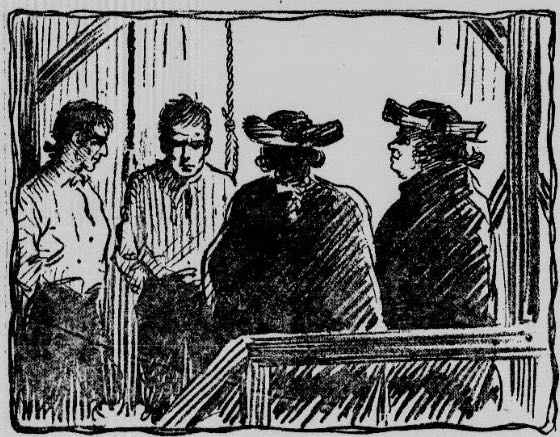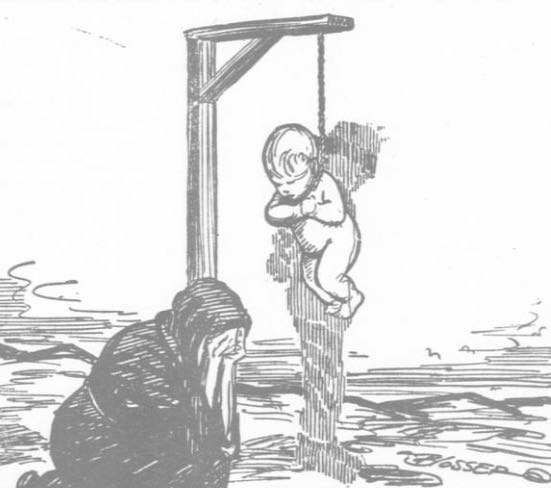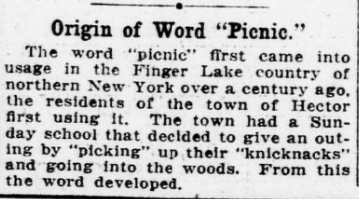
This newspaper article from 1912 is an account of several hangings that happened in a jailhouse one afternoon. For the most part, it is a grim account of how hangings were done during the time. For weak hearts and stomachs, this is not recommended reading. The account itself is sad, especially when you read about the 18 year old who was getting hanged.

An Eye Witness Tells How Chicago’s County Jail Hangings of Yesterday Effected [Affected] Him
Written for The Day Book by Correspondent William G. Shepherd.
“How did my boy die?”
It was’t a mother or a father asking the question. It was a deputy sheriff, who stood on the gallows looking down at the swinging form of an 18 year old boy about whose neck he had fastened a rope five minutes before.
“Wasn’t his neck broken?” insisted the deputy, talking to one of the dozen doctors who were examining the boys body. When the doctor answered in the affirmative the deputy stepped back from the trap hole, satisfied.
What you see at a hanging is one thing; it shows you what society is doing to criminals. But what you HEAR at hangings shows you what society is doing to itself when it takes the life of a human being.
I’m going to put down what I heard — the talk of men — at the hanging of Philip Sommerling, 34 years; Thomas Schultz, 18 years; Ewald Shiblawski, 24; Ewald’s brother, Frank, 21, and Thomas Jennings, 35.
For two hours and 10 minutes there were gathered in the vast high ceilinged room 42 physicians, 35 guards and 20 newspapermen. They were the representatives of society, and I want to show, by the things I heard them say, what hanging does to the men who are not hanged.
In his office, before we went into the death chamber, I asked Deputy Sheriff Peters how many men he had hung.
“Why, young fellow,” he said, “I hung men before you were born. I hung the Haymarket rioters. And I’ve hung 40 men,” he added, proudly.
“Have a smoke,” someone said to Peters.
“No. No smokes, eats, or drinks until this job is done. Then I’ll go out and take a stiff drink of whisky. I always have a reaction after a hanging. It always makes me tired and sick.”
“Doctor! Doctors! exclaimed someone in the hallway.
We looked out of Peter’s office and saw a double line of deputy sheriffs, leading from the main door of the jail. Between them was passing a line of 42 physicians who were being admitted to the death chamber.
Peters went to the telephone and called up the state’s attorney.
“Theres a fellow who’s trying to four-flush in Judge Landis’ court to make us put off this hanging. Its a piece of hocus pocus. The fellow just wants to get into the limelight. I want you to understand that I’m going to go right along with this business.”
When he had hung up the receiver, Peters said to a deputy:
“Fix up the sawbones! Get them in their chairs and then we’ll get busy.”
“Press! Press!” a deputy called. That meant that the dozen newspapermen were to go into the death chamber.
A doctor tried to squeeze in with us.
“No! No! You can’t go with these fellows. Sit down with the doctors. You can examine the corpses with them.”
The doctors all sat in chairs, at the foot of the high scaffold.
I heard one doctor with whiskers talking to another.
“Hanging is all damn foolishness,” he said. “Now here are four good strong men. One of them has a penniless wife and baby. The murdered man left a penniless wife and baby. Why don’t they put these four men in jail somewhere for life, and make them work to support the two penniless women and their babies? Ain’t it damn foolishness to kill them?”

I heard a guard say:
“There’s a fellow in New York city who’s the best executioner in the country. He’s killed 140 and he never makes a miscue. Must have nerve, huh?
“What’ll you have to eat?” one reporter asked another when they sat down to a reporters’ table that was covered with a white cloth.
“Yow! yow! yow! yow!” These noises came from the cells. Inmates of the jail were rattling their bars, helping and pounding tin cups. The death march had begun.
“They’ll show up around that corner in a minute,” said one reporter. “I’m an old hand in this hanging room. I’ve seen 17 hangings here.”
There was the shuffle of feet on the iron floor and the procession walked onto the gallows from an upper tier. There was a priest, in white, officers in blue and two men, roughly dressed — the Shiblawski brothers.
All you could hear was the murmur of the priests prayer, and murmur of the men, who repeated his words in low tones. What were they saying? What kind of a prayer do men make on a gallows?
No one could hear their words. The brothers kissed the cross which the priest held to them. While this was going on their legs and arms were being strapped. We tried to hear what they were saying as the deputies put a white shroud about their bodies, but we stopped trying when the white caps were tied over their heads. Everybody seemed to be working slowly on the gallows. One brother turned his muffled head toward another. we heard the murmur of his voice.
“Crash!” — that was the next sound. Then came the scuffling of the feet of 14 doctors, as they walked to the two bags, their contents twitching, which hung from the swaying ropes.
The reporters rushed to a back room, where their telephones and telegraph wires had been placed. I caught these bits of news as they talked: “Just as the writhing body of the body stopped swaying.” “Strangled and gurgled.” “Twitched like cats in a bag.” “Oh, is that you taking my stuff, Bill? Great show. Great show. Three more to come.”
“What, in Christmas, was that prayer?” said one reporter.
“I don’t know. Tell your office to look it up in the prayer book. They can copy it from that.”
Two men were fixing up two other ropes. They carried out the two bodies on a wheeled table, covered with a white cloth.
“Both of their necks were broken,” said a doctor, coming to the reporter’s table.
During the lull I talked to seven of the 14 doctors who had examined. I wanted to know whether they believed in capital punishment. Not a one of them did.
“Capital punishment doesn’t keep people from committing murder unless you hang men on a high gallows, in a big space, where all the folks in the city can see it,” said Dr. A.C. Koethe.
“This is my first hanging and my last,” said Dr. I.E. Hoffman. “After this I don’t believe in capital punishment. I can see a patient die, but to see sane men kill a well man, in cold blood — excuse me.”
All of this talk was sort of “between the acts.”
“Hats off! No smoking!” called a man in overalls, from the gallows.
The next sound was that of the prison inmates, who were watching the death watch. Then we heard the shuffle of feet and again the priest and the deputies in blue brought two poorly dressed men onto the scaffold.
“Well, the other two got across in time for lunch,” said one deputy in a seat near me, looking at his watch.
“These fellows will eat with them,” answered another guard. “But I guess they’ll all get there too soon to please them.”
The two men in poor clothes stood on the trap where the deputies placed them. One of them wasn’t a man, but a boy, Thomas Schultz, 18 years old, son of immigrants, who, as one reporter said, “hadn’t done anything but get into bad company.” And now we knew what the prayer was, for John raised his head and looked up. He fixed his blue eyes on the high ceiling; he repeated the words which the priest murmured.
“Oh, Christ! Have mercy on my soul!” His words rang out, clear as a bell. “Holy Mary, intercede for me! Pray for me! Bring me to everlasting life!”
The deputies were tying the straps about his arms and legs.
Another of them tied the white shroud about the boy’s neck.
“Savior, save me! Forgive me my sins!”
“Listen to that young fellow pray,” said a reporter.
“Christ, I love thee!” said the boy. In the white covering he looked like a choir boy.
“Grant me to live with Thee. Forgive me my sins.”
While he said these words, still looking upward, William Davies, the jailer, put the noose over his head and tightened the knot under the boy’s ear.
Another deputy was doing the same to Sommerling.
“Forgive me my sins! Forgive me my sins!” rang out the voice of the boy. His voice was growing louder; there was a tone of wildness in it.
“Holy Mary!” — “Crash.” It was an awful thing to hear in the same moment those words from the mouth of that boy and that sound. But they came together. Again the feet of 14 doctors scuffled over the cement floor to the white, swaying, twitching bags.
There was another intermission.
“Now, if this man’ll only confess before he’s hung, you fellows’ll get a fine top-off for your days story,” said a deputy sheriff to the reporters.
“We’ve got a good early start in the day’s work,” said a reporter. “Are you going out for lunch? Why don’t you sheriffs go out now and then come back for the afternoon’s work? You can finish a lot of them at this rate.”
“Gee,” said a young doctor, coming up to Jailer Davies, “I thought you’d left your handcuffs on that young fellow. I lifted up his hand and I didn’t see that another doctor was holding it by the elbow. I thought his hands were locked together, because I couldn’t move his arm.”
“They don’t suffer,” another doctor was telling the reporters.
“But isn’t there some easier way to kill a man?” asked a reporter.
“I should say so,” said the doctor, “They could put a tiny drop of hydro cyanic acid in his soup some day and in an instant he would be stone dead, without a twitch or a pain. Or they could kill a man with morphine and he would die pleasantly, in beautiful dreams. But this hanging! It’s the crudest thing in civilization.”
“I saw a doctor put young Schultz’s neck back into place in fine shape,” said a deputy — “just grabbed his head, gave it a twist and it snapped right back where it belonged.”
I saw plenty of smiles during the two hours and 10 minutes. I heard plenty of attempted jokes and commonplaces, among the 42 doctors, and the reporters and deputies. Why did we smile and try to talk of everyday things?
Because hanging is so awful that a man who witnesses it dare not admit to himself how awful it is. He knows, in his heart of hearts, that the cold, deliberate killing of a man by his fellow men, brutalizes the killers — and that is all society — just as surely as it ends human life. Perhaps the killers suffer more harm than the killed.
[Source: Shepherd, William G. (1912, February 13). An Eye Witness Tells How Chicago’s County Jail Hangings of Yesterday Effected Him. The Day Book.]

